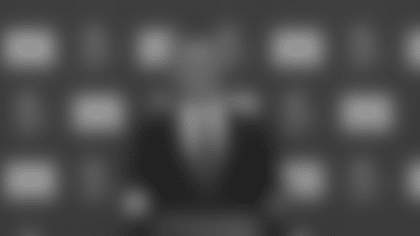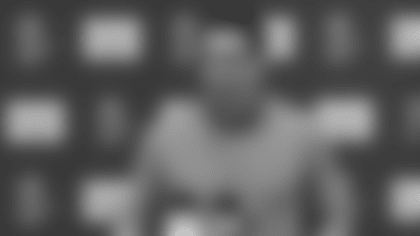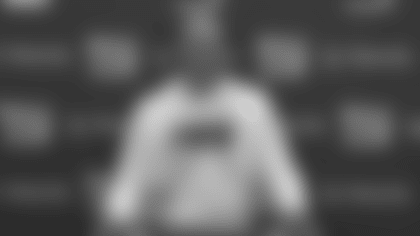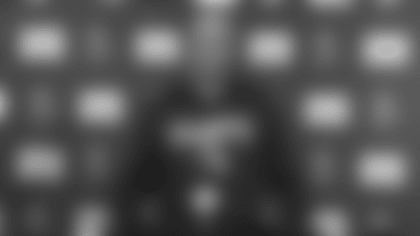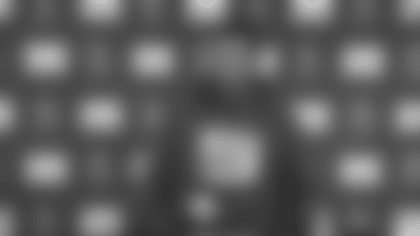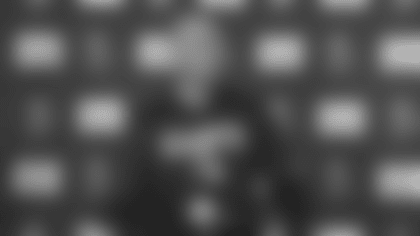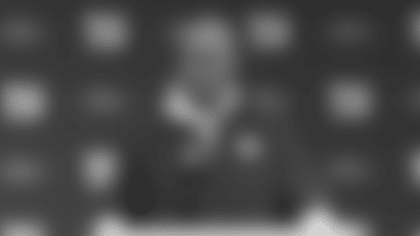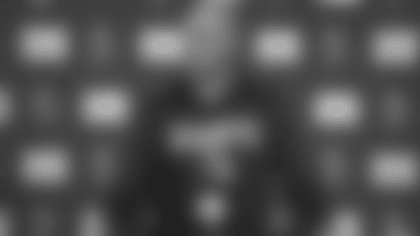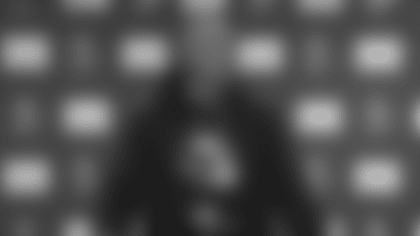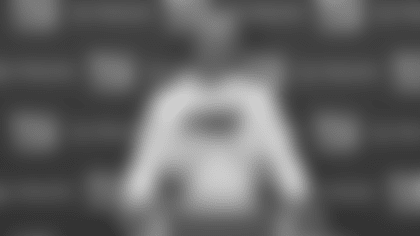Assistant Head Coach/Defensive Coordinator Patrick Graham
Q: When you're watching the film on the Saints, from what I understand that even though (Saints Head Coach) Sean Payton still has that aggressiveness to him, they have been playing a little bit more conservative funneling everything through (Saints Running Back Alvin) Kamara. Is that what you see on film and are you almost waiting for the game where he's just going to start launching bombs down the field?
A: Well, I wouldn't say it's conservative. I think because Coach Payton is such a good offensive mind – and a great head coach and a great offensive mind, he's really playing to his strengths. I mean, he has one of the best players in the league back there. So, to me, whether he's running the ball or catching passes – if I were him, I would funnel it through him, too. This guy is pretty good. I've been in the league for 13 years now and he has a unique skill set. He's challenging to prepare for because of the pass game and the run game because even when you think you've got him bottled up, he gets the leaky yards. All of a sudden, you watch the New England game last week, the first two, three runs, negative run, gain of nothing, gain of nothing and then all of a sudden you just figure he's getting hit at two yards, but he falls forward for five. It's a big challenge and then he catches the ball, and then the first touchdown he caught was out of the backfield, so I think he's just funneling through the top guy, in my opinion. That's how we're looking at it. He's the guy we've got to try to stop. We've got to try to stop him.
Q: Talking about him as a receiver, obviously (Linebacker) Blake (Martinez) played every snap and I can remember Blake making a great play down the middle in the preseason on an interception, and then I remember (Linebacker) Tae (Crowder) struggling giving up a big play against Washington to a running back. So how do you cover a running back without Blake?
A: Everything we do is collective, so it's the full 11. One, it starts with what calls we're going to make in terms of when those guys are in the game and then utilizing different linebackers, safeties, DBs. I would say for him, we've got to be mindful of we're going to have to use different people. It might be a backer one time. It might be a combination of a backer with a safety helping or something like that. It might be a defensive back. It might be a corner. But we're going to have to move it around because he's such a challenging guy to prepare for.
Q: What were your emotions right after the Atlanta game ended where coming off Washington, you had a lot you saw you needed to fix? There were stretches in Atlanta where you guys played well, but then the same stuff happens at the end. Just what were your emotions as a DC?
A: Well, the funny thing and again, it's just when you're in this role, in a leadership role, your mind tends to go right into the next opponent. As upsetting as a loss is, my focus right then at the end of the game was like, 'what do we have to do better?' And again, what do we have to do better in order to prepare for the Saints? That's really where it goes to. The emotion part of it, I don't know how much emotion comes into play for me in that case. But in terms of how I think, I'm just thinking about, 'OK, what do we have to do?' Because at that point, I'm thinking about New Orleans, the next game, because you have to. You have to and just what can we do better? How can we put these guys in better spots? And we've just got to try to figure out a way to win. But really my mind went to New Orleans and all the guys we've got to prepare for with them and so that's where it really went to. I don't know if emotion came into play.
Q: Seven drives so far this year began or ended within two minutes of the half. On five of them, you guys have allowed some sort of score. What do you think when I say that to you?
A: I think we've got to work two-minute today at practice (laughs), and that's what we're going to do. Again, I'm not trying to make light of it. That's not good enough. But again, in terms of how I've approached it all the time, we've got to practice it. Obviously, we went back in the lab and tried to figure out better ways collectively, talking as a group, as a staff and just trying to put players in the best spot possible to be successful. Thankfully, we've got another opportunity and it first starts with today. Today we've got a big day. Today's a big day, two-minute, third down, finish up some early down stuff, but it starts with practice.
Q: But in order to correct it, can you put your finger on what's going wrong in those situations? If you look at it, you didn't let up anything against Atlanta until those situations. When you try to put your finger on it, what do you see? What are you looking at?
A: Like any situation, for me, just like in looking forward for this week because we're dealing with a team, Coach Payton over time in terms of two-minute has been one of the most effective coaches in the league. So to me, it starts with, 'OK, what unit are we going to put out there and what call we're going to make in terms of the situation.' So that's where it starts and just trying to put the guys in the right spot, so like, whatever happened in the past – was it good enough? Was it not good enough? And then we've just got to figure out what's going to be better for this week. That's really how I approach it, if that makes sense.
Q: On the pass rush, do you have to start bringing more pressure, like blitzes off the edge, corners, if the front four is not getting there? Or are you going to just count on those guys to start getting there? Or do you need another pass rusher?
A: What do we need? We need, as a group -- I'm talking about coaches, players, everybody – we've got to execute the scheme and we've got to execute the scheme at a high level. Again, pass rush, whether it means getting to the quarterback for the sack or just affecting the quarterback, it just varies based on the situation in the game. But like who we're going to bring, this game might be different than the last game. If you look over the first three games, stuff is a little different. But for this game in particular this week, I don't want to divulge anything that we're going to be doing. I think one thing you know is pressure's a good thing. You've got to go down there and be aggressive when you're going down there to New Orleans. But again, pressure can be four guys coming, it's just how we configure them.
Q: What have you noticed about (Saints Quarterback) Jameis Winston?
A: Well, I noticed this is a big guy. He's a big man that is looking to push the ball down the field. I think he does a good job of doing that. I think he's making better decisions as of late in terms of the last time I went against him. The thing is, when he's hot, he's hot. He can really torch you. So, we've got to be mindful of that. This guy has a big arm. He's athletic in the pocket. He's not the most – like, he's elusive in the pocket and he can make plays with his feet. I think he's making good decisions in their check-with-me game. You see him make checks into runs. I think he's grown as a player. I think he's grown as a player and I think that time with Coach Payton, that time with (Former Saints Quarterback Drew) Brees has really helped him develop. It's good to see that development. You like to see young players develop over the time in the league. But it's going to be a challenge. It's going to be a challenge. This guy has a big arm. He has a big arm.
Q: Is Crowder going to wear the radio?
A: We'll see, but he's the one that did it for the game the last game. You've got to ask (Head Coach) Joe (Judge) all of that stuff. But we have no reservations with Tae wearing the green dot. He's a good communicator.
Q: Obviously, you're going to be without Blake. You have some linebackers that can step in, can you get creative with other people at that position?
A: The funny thing about the league is these guys all prepare to play. So, whether they play 10 snaps the week before or 55 snaps, they're all in tune to the game plan and I trust (Linebackers Coach) Kevin (Sherrer) to get that stuff to them just like I trust the other coaches to get that stuff to them. So, for us, really, we're going to put the plan together of what we think is best to beat New Orleans or to limit them and see how it goes on Sunday. From there, I really don't get too concerned because it's a contact sport. It's a collision sport, actually. So, you're going to have guys have to step in and play, so we prepare all the guys to get ready to rock and roll.
Q: You have four safeties who have played quite a bit, can you use one of them as an inside linebacker or is that getting too small on defense?
A: We do that already. We use that. It's going to be different people, backer, safeties, different people, defensive backs, in terms of corners. So, we've already done that, so that's already a part of the scheme.
Q: It seems to be something coaches say a lot, not just here but everywhere, pressure – it's not about sacks, it's about pressure. Maybe I'm oversimplifying it, but if it's 2nd-and-two and you get pressure and he throws an incompletion, it's 3rd-and-two, but if you get a sack it's 3rd-and-nine and that's a lot harder to convert. So in a way, isn't bringing the quarterback down extra important more than just pressure?
A: I think it's a culmination of the different factors, whether you're batting a pass, you have people by his feet in terms of getting push in the middle, you sack him. I think it's all important. I mean, all important. The best teams that I've been a part of in terms of the pass rush, I don't know if we were ever in the top-10 in sacks, but in terms of the effect on the quarterback and it's also the coverage and the disguise. It all plays a factor in it and I understand. I get your job. Like sacks, that's what everybody talks about. I got that, but it's hard. Just think about this. Just think about this. The league right now is crazy, everybody's throwing the ball 50 times a game. But let's just think, OK, there's 50 times in a game they're throwing it. Let's just go normal, 40 plays in a game they're throwing the ball, all right? Of those, let's say five are boots, so that's run action, whatever. Then you say another 10 are play action, so now you're already down to whatever the number is there. Then you've got in terms of, OK, what situation is it? Third-and-two, I might be playing run game, so am I really teeing off for pass rush right now. So let's take those situations – 2nd-and-two, 2nd-and-four, like you say, now that's another 10 plays where you might be playing run. You're two-gapping and the guy transitions and now you're down to maybe 10 plays where you know it's pass, and you might not even be in the game. It's hard and then for me to tell the guys, you have to get a sack on those 10 plays, those guys get paid to. How can we affect the quarterback? It's an incentive too for the players.
Q: How would you compare how (Safety) Julian (Love) and (Cornerback) Rodarius (Williams) did in their increased action last game with (Cornerback) Darnay (Holmes) not playing?
A: I think they did a good job in terms of they knew what to do, played hard and everybody has room for improvement moving forward.
Q: Why did you go that route? What was your decision-making process when you decided to go that route?
A: Just like for the Saints this week, it's always what we think is best in terms of the game plan. Any decision we make in terms of that, that's the reason why.
Offensive Coordinator Jason Garrett
Q: (Head Coach) Joe Judge said the other day you guys need to make some adjustments to put people in favorable positions particularly in the red zone. How dramatic do you think those adjustments need to be and what do you think they need to be?
A: I think you're always trying to do that in all parts of the game. Obviously, we need to score more points. The red zone, I think we've been one out of three in each of the three games. Got to get down there more. Then we've got to convert. Some of that is self-inflicted wounds. Last week, we had a good opening drive. We had the sack on the play that put us behind the sticks on that first drive – hard to dig out of that 11-yard sack. Then, we had the fumbled exchange on the next drive when we were down there. The third time we were down there, we scored the touchdown. We certainly want to evaluate every aspect of what we're doing running it, throwing it and in all situations. We've got to do a better job scoring points.
Q: Big-picture question – what advantages do you think your scheme presents? What are you putting pressure on defenses with?
A: You try to attack different ways. Run and pass is where it starts. I think we've done a pretty decent job being balanced over the first few weeks. We've been able to move the ball. Situationally, we've done a pretty good job except for the red zone. At the end of the game, the two-minute wasn't as good as it needed to be, but some of the other stuff was better – third down, short yardage, goal line. Those were positives. You try to attack with personnel, formation, tempo – been using tempo a lot lately. You try to attack different ways. You try to be balanced. We're a work in progress. We'll continue to try to get better.
Q: When (Wide Receiver) Kenny (Golladay) was in Detroit, he thrived on making those plays down the field. Do you feel like you guys have been targeting him enough in those situations and trying to target him?
A: I thought Kenny did a good job in the game the other day. Didn't really practice all week and then went out and played well and made some plays. They were playing out of there a little bit, so he caught some intermediate balls, made some good catches, and then made some good runs after the catch. He'll continue to get closer and closer and continue to get better. He's done a good job with the opportunities he's gotten.
Q: Offensive coordinator in the NFL has become one of the most scrutinized positions, really in sports – high credit, high criticism. Do you feel that and are you aware of that?
A: I think the biggest thing we try to do is just focus on what we can do to help our team get better every day. Those are things we talk about with our players all the time and we have to live that as coaches. There have been some positive things over the first three games that we can continue to build on, but there's certainly plenty that we have to clean up, so we come to work every day. We try to work hard as coaches to put the best plan together. We try to do a good job implementing it. We ask our players to practice it and carry it to the game, and that's the process that we're in and that's really what we focus on.
Q: Do you feel any extra pressure with that being the play-caller? Do you personally feel that pressure to kind of make this thing work?
A: Absolutely. It's a responsibility and it's one that we all embrace. Whatever our role is, you want to embrace those roles.
Q: (Former Giants Linebacker) Carl Banks was on the radio here in New York this week and he said, 'The Giants need to have a blunt conversation with (Running Back) Saquon (Barkley) about becoming more of a north-south runner.' Have you had that conversation, and do you agree that he needs to be more of a north-south runner?
A: Saquon Barkley is a hell of a football player and he's a hell of a football player for lot of different reasons. He can attack the defense a lot of different ways. I have tremendous admiration for him, from afar competing against him and then having a chance to be around him. He had a really significant injury last year and how hard he's worked to come back and play, and play as much as he has early on in the season, has been really, really impressive. I think the biggest thing with Saqoun, is you don't want to take the Saqoun out of Saquon. We talk a lot about dirty runs, four and five-yard runs that nobody talks about, but they'll put you in a manageable second-down and third-down situation. It's important for us to be able to do that. He did that in the game the other day – there were a lot of three, four, five, six, seven-yard runs that nobody talks about that were positive runs. But in an effort to do that, you never want to take away his ability to make big plays. The space plays that he makes are dynamic, he's done that ever since he's been in the league. We were on the other side of it in Dallas, he made some of those against us, so we know the challenges that that presents. Absolutely we want to be physical, we want to be downhill, he's a part of that, but at the same time you don't want to take Saquon out of Saquon.
Q: Does he look like somebody who trusts his injured leg?
A: To me, he's just done a remarkably good job coming back and he's getting better and better the more opportunities he gets.
Q: What improvements have you seen from (Quarterback) Daniel Jones and what can the offense do to maybe capitalize on some of these games where he throws it well and doesn't turn it over?
A: Daniel's done a really good job. I think probably from the middle of last year, he's done a really good job having that balance of making some plays in the passing game, making some plays with his feet, and then not having the negative plays – particularly in relation to the ball. That's a challenge for every quarterback every week in the NFL. To make plays, but also not to have the bad plays, not to turn the ball over. He's done a good job of that and we'll just have to continue to grow around him and get better, then take advantage of that like you said and score some more points.
Q: Specifically, you can do that if you help him out a little?
A: Again, we try to put a good plan in place to do that not only for Daniel, but for our runners and for our receivers and for our tight ends and play to their strengths. We'll continue to try to do that.
Q: I think that's the question that people have, when does it lead to more points? What needs to happen in order for you guys to score more?
A: Probably a combination of factors as referenced earlier with the drives last week. There were some self-inflicted wounds once we got down there. I think we've done a good job moving the football, both run and pass, attacking different ways. We just have to in that situation do a better job executing. We look at ourselves first as coaches, what position we're putting our players in, how we're implementing that stuff in practice, how we can carry that into the game. Having a negative play on a sack and a negative play on a fumbled snap, those are hard situations to overcome.
Q: How much do you need them to score points? The reality is last year you guys were 31st in points scored. You're 0-3 as well, while we're standing here. Do you feel the need for this to turn around now in order for you to remain the play-caller?
A: I don't really think about that. We've just got to get better. We come in and we work hard to try to do that as coaches and as players every day. Had a good day yesterday, got to come back and have a good day today.
Q: You guys punted from the 39 on fourth-and-four, I think it was. When an offense is struggling to score points and trying to gain confidence, is it important maybe to go for it in situations like that?
A: I think Joe has a great feel for those kinds of things and those are his decisions.
Q: What's your input on it then? How does the process go? Where is your input on those kinds of decisions?
A: We're always ready to go in any situation. We always have plays ready to go and then Coach makes those decisions.
Q: You don't lobby though one way or the other?
A: Again, he has a really good feel as to what he wants to do. He knows we always want to go for it and in all situations we'll be ready for whatever he does.
Q: You mentioned those two drives and how a negative play here or a negative play there really derailed them. How tough is it though to sustain drives the way you guys are trying where it's like moving down the field kind of methodically? Do you need more big-chunk plays to score from 40 yards rather than having to—
A: Absolutely. Scoring from out certainly helps and making some big chunks helps. If you look at the stats in the NFL – the scoring, the relationship between scoring on a drive when you've made a big play and you haven't made a big play, there's a significant spread there. We've made some big chunks. In the passing game, I think we had six or seven explosives the other day. We have to continue to do that. That's what gives you a chance to score points.
Q: With (Wide Receiver) Kadarius (Toney), we've asked you every week – last week his snap count went way up. I don't know if that's circumstance or if that was planned based on the injuries that you had.
A: I think the biggest thing with him is that he missed a lot of time both in the spring and in training camp. Over the last few weeks, he's been able to practice more. We want to play him. We drafted him in the first round, we want him to do well. I think he's done a good job with the work in practice. He was going to play a lot in the game last week. Obviously, when (Wide Receiver Sterling) Shep (Shepard) goes down and (Wide Receiver Darius) Slay (Slayton) goes down he was going to play more and I thought he handled that work really, really well. He's gotten better and better every day and every week.
Q: If (Offensive Lineman) Ben Bredeson can't play, you could have your fourth different left guard in four games. How debilitating is that to an offense not to have that kind of cohesion?
A: I've just been really impressed with those guys. (Center) Billy Price comes in, he's the seasoned veteran, he's been here for about three weeks. Bredeson has come in here, he's played a lot of snaps. We'll have some new guys in there. Give (Offensive Line Coach) Rob Sale and the guys on the offensive line a lot of credit, but give those players credit. They've come in here, they've learned, they've spent a lot of extra time. They're working hard in practice and they're carrying that to the game. They're real professionals and we're excited to have them on our team.
Special Teams Coordinator Thomas McGaughey
Q: (Punter) Riley (Dixon)'s punt – did he just mishit it?
A: Yeah, it was a windy day. No excuses, but it was what it was. It was probably reminiscent of the old Giants stadium. We haven't had one of those in a while and you just got to be able to adjust. Yeah, it was just a mishit ball and we'd love them back, but that's the game. That's football.
Q: What did you think of the possibility of (Kicker Graham) Gano – you guys were on the 39-yard line and it would be about 56 yards. What did you think about that distance on that day?
A: At that time of the game, the situation and the wind, it was just so iffy. You want to be able to believe in the defense and put them in a good position with a good punt and put them on a long field because the percentage is say, you got a better chance of holding them from a score and you're down a ball inside the 10 or down inside the five. Having that ability as opposed to trying to kick a 58-yard field goal or whatever it is. Into the wind or swirling wind on that end, so just understanding the situation and it feels like at one point the wind was in your face on both ends. It was just one of those days. It was just a little windy in there and you don't want to put – even as good as Graham is, you don't want to put him in a situation where you give the other team good field position by trying a long field goal.
Q: This week in the Superdome, I assume that changes?
A: Absolutely. Totally different situation, right? You're in the Superdome, but again, MetLife versus the Superdome, two totally different places as you know. (Head Coach) Joe (Judge) is always great at playing the situations as it occurs in front of us.
Q: Do you know what his (Gano0 range is? Do you have to wait until that day?
A: You got to wait until that day. Sometimes guys feel really good, sometimes they're just feeling okay. But Graham has good range. We've all seen it here. Graham has a really strong leg and when he's called upon, he always does his job for the most part.
Q: You said that Joe is great playing through the situation there. What's your role in that? What do you provide?
A: Really, honestly, in that situation, Joe understands the kickers range in that situation because he's been a special teams coordinator. He doesn't have to come to me to ask me a bunch of questions. He knows. We've already talked about it and you don't really have to have a lot of discussion. Either we're going to punt it or we're going to kick it, one of the two. More than anything, it would be a discussion with Graham, really isn't because Graham, you ask him and he's going to say, 'Yeah, I can kick it.' That's what kickers do. In their mind and they're supposed to think that way. But no, those situations are always talked about well in advance and we know what his range is going into those situations and we're constantly talking about it on the headset. It's not like something that like all of a sudden, he just makes the decision. It's a constant flow of conversation during the course of the game.
Q: At the moment or at second or third down, are you already discussing it?
A: Yeah, we're always talking. We're talking throughout the whole game. Again, it's a constant conversation between me, Joe and (Assistant Special Teams Coach Tom) Quinn on the sideline. We're always talking Riley, talking to Graham. It's always how we're going to kick, we're to punt. Just having everybody alert on the sideline and talking through the situations before they come up.
Q: On kickoff, if there something (Running Back) Devontae Booker wasn't doing well? I know he was on there and you guys scratched him.
A: That's just inactives. Wasn't anything he did. It's the flow of the inactives and actives.
Q: So, you thought he was fine on the kickoff?
A: I'm not saying that I thought he was fine, I thought he was not fine. It was just he was up, if he's in the game, if he's up, he's going to play. If he's not up, he's not going to play. That's just the inactives, actives, inactives. That's just how it works. If a guy is up on game day, he's going to play. If he's not up, he's not going to play.
Q: I meant is his being inactive related to failures on special teams?
A: No, no.
Q: You're going to a place where they have a statue of a blocked punt outside from the last time, they were in a situation like this. How do you prevent your team from being statued?
A: You just play good football. We all know about the Superdome and what it entails and the atmosphere. I've been there, national championship experience, I've been in a playoff game. The Superdome is the Superdome. Sugar Bowl, whatever it is, it's the Superdome. It's electric. It's a great place, it's great venue and if you don't get excited about going down there and playing in that environment in this situation, you got issues. This is a great place. The statue is a statue. It's history and New Orleans – in that time, in their history, that was a strong play that was made at an opportune time by (Former Saints Safety) Steve Gleason. What else can you say about it? That was a monumental time for that city, and it brought them together. It has nothing to do with us going down here and playing a football game. That's in the past and right now, we're taking advantage of the opportunity that we get to go down there and play a football game.
Q: Were you still down there when that happened?
A: No.
Q: Were you here?
A: I was actually in Denver at the time. Yeah, I was in Denver at the time. Obviously, being down there after the situation because I coached at LSU maybe five years after the situation, it was still – and I'm from Houston so, a lot of people moved from New Orleans to Houston. Trust me, I've got a strong grasp of the situation.
Q: I would imagine you still know people down there and are friendly with people down there?
A: Oh, absolutely. Yeah, absolutely.
Q: You don't want to compare Hurricane Katrina to what they're dealing with, but it's been so many days, you know that community down there, Joe mentioned the atmosphere yesterday. You kind of know what you're walking into.
A: Absolutely, absolutely. Make no mistake about it. We understand what we're going into. We know the situation. It's very similar to what it was the last time. We just got to go down there and play good football and understand that's what it is. It's New Orleans. It's after a hurricane, it's very similar to the Katrina situation. We embrace the opportunity. Like I said, I love going to the Superdome, I absolutely love it. Our guys, I think they'll embrace it too.
Q: I feel like I'm old enough to remember when 45-to-50-yard field goals were not a sure thing, now the numbers are 66 percent of them are converted. When did that change and how did that change? (Ravens Kicker) Justin Tucker is making a 66-yard field goal.
A: It's crazy. It really changed probably right around the mid-90's. I'd say mid to late 90's when it went from the backup quarterback being the fulltime holder to where the punter was the fulltime holder and then you had a fulltime snapper. It wasn't (Former Titans Offensive Lineman) Bruce Matthews snapping.
Q: When it became more specialized?
A: Yeah, when it's specialized. You have a fulltime snapper, a fulltime holder and a kicker that's there and all three of them are working together every day in practice. That's when it changed. When the league went to that, that's when it changed. That's what like anything else, you get better at it, you practice it every day, you're going to get better at it. That's why the percentages have gone up since.
Q: Has (Safety) Jabrill (Peppers) recovered from that vicious hit he took on the fair catch?
A: (laughs) He tried to give them his best Dennis Rodman.
Quarterback Daniel Jones
Q: It's quiet now, it won't be on Sunday, how will you get the feeling of that? Obviously, we heard some of the noise being pumped in.
A: Yeah, we'll be ready for it. We tried to simulate that today in practice and we'll keep working that, but (it's) definitely going to be part of the game and something we're going to have to prepare for, and we are preparing for it. So, we'll be ready for it.
Q: Did you check at the line a lot more or was the microphone just more sensitive this past week? We heard, 'Blue Picasso,' and a lot of stuff like that a lot.
A: We were out of the huddle for most of the game, so just communicating at the line of scrimmage.
Q: Just how much tougher is that to do that when you can't say words really to get the message to everybody?
A: Yeah, a little tougher to do that. But like you said, we'll be ready for it, however we need to communicate.
Q: Have you met (Tackle) Isaiah Wilson yet?
A: I haven't got a chance to speak to him yet. First day, but I look forward to meeting him.
Q: What is the team's thought when you guys bring in somebody that's had some legal trouble in the past?
A: I don't know if that's my place to comment. He's a talented guy and we're excited to work with him.
Q: Four left guards in four games, that seems to be a possibility here. How wild is that to you and how much does that add to the challenge of what you guys have to do (with) new guys on your offensive line in this environment?
A: It's tough. Tough to see guys go down and we're working through it, but we'll be ready to go. I feel for the guys who have gone down for sure. (Offensive Lineman) Matt (Skura) will be ready to go or whoever's in that spot. We're looking forward to it.
Q: Do you think your red zone offense requires any kind of dramatic changes from a scheme standpoint or what you're emphasizing or what you're running?
A: No, I think it's on us to execute what we have. I think you look at the situations in the red zone, there have been costly mistakes and breakdowns in the execution of plays, and we've got to do better. I've got to do better in a lot of those situations. We've got the stuff – we've got to execute it as players.
Q: Just wondering, how much different is it for you when you're in the red zone to run the play under center versus in shotgun? How much does it change how you operate on the play?
A: Not much, to be honest with you. I think certain plays we want to be under center. Certain plays, we want to be in shotgun. We can do that in the red zone just like we can in open field.
Q: Did you just take your eyes off that one snap last week?
A: Yeah, I just took my eyes off it.
Q: Before (Wide Receiver) Kenny (Golladay) came here, he had a reputation of making big chunk plays. Why hasn't he had a big chunk play yet?
A: I think that's something we're certainly working on. He's a guy who can do that and has shown he can do it. We've got to convert those opportunities in the game. We're certainly working on it and looking forward to connecting.
Q: (Offensive Coordinator) Jason Garrett has taken some heat with his play-calling in various spots throughout his year-plus here. Does the team still have confidence in him? Do you still have confidence in him?
A: Absolutely. I have a ton of confidence in Coach Garrett, and I know the offense does. It's on us to execute those plays. Like I said, talking about some of the breakdowns in the red zone, those are execution issues and things I've got to do better, things we all have to do better on the field. We have a ton of confidence in what we're doing on offense and what we're doing as a program.
Q: Why? Like what is it that gives you that confidence? What do you see from the offense that says, 'Hey, this is going to work eventually'?
A: I think when you look at the mistakes that are happening, you look at the reasons it's not working, it's players. It's breakdowns in execution and not doing what we need to do in certain situations. I think that's the truth and that's what we're focused on correcting. It's what I'm focused on and our offense is.
Q: I would imagine you'll be without some of your top receivers this week. How ready is (Wide Receiver) Kadarius (Toney) to step into a bigger role and does that change things because he's not necessarily the same skill set as (Wide Receiver) Sterling (Shepard) or (Wide Receiver) Darius (Slayton)?
A: Yeah, I think he's ready to go. All our guys are ready to go. Obviously, Shep and Slay have made a lot of plays for us and guys we've counted on, but you talked about KT and the rest of the group, those guys are ready to step up and make plays. We'll play to their skill set. Looking forward to getting out there with them.
Q: Why do you think your running ability and scheming you on the read option was less of an emphasis Sunday versus the week prior? It seemed like it really worked against Washington.
A: I think it has a lot to do with what the defense is doing and kind of their game plan, their scheme. I think Atlanta had a little bit different approach to some of those things and made that less of an option for us. I think it's about what the other team is doing.
Q: At what point does time run out for you guys to turn it around? I know you can't think like that, but I'm just saying as a player at 0-3, how do you view the urgency of turning this around before it's too late?
A: It's very urgent. It's certainly urgent. As players, we feel that. We realize that and we understand this week and how important it is. So, we've got to stay focused on what we're doing today, making sure we're preparing as well as we possibly can today. Tomorrow, we do the same thing. Saturday, we do the same thing and we'll be ready to play Sunday. I think everyone understands the urgency and the importance of preparing and playing well.
Running Back Saquon Barkley
Q: It's been about 21 months since you've walked off the field with a win. How much does that weigh on you?
A: Obviously, not just myself, but everyone in the building. We come in every day and work hard. The whole objective at the end of the week is to get a win. I haven't done that for a long time, and we haven't done that yet this season, but we've just got to come in – we've got a great game plan, come in, execute, and hopefully come out with a win.
Q: You said something after the other day after the game, 'It's time for some change. Somebody has to step up and make a change.' It sounded like you were taking accountability maybe a little more than we've heard from around here during all the losing seasons. Do you feel that as the face of the organization that you have to be the one to make a change?
A: No. You can't have that mindset that it's got to be one person. That doesn't work. Football is the greatest team sport for a reason. We have a whole bunch of leaders and a whole bunch of great players on this team, and we've just got to go out there, execute and make the plays when need be.
Q: So, it wasn't like you were trying to send a message to the fans or to your own locker room or anything like that.
A: No. If I have to send a message to the locker room or say anything to the guys in the locker room, I would say it to ourselves, internally.
Q: You've been getting a few more touches as you've been kind of working your way back. What do you anticipate your workload being this week?
A: My touches have been going up, my workload has been going up. Every week I'm getting better. It's part of the process of just coming off of a major knee injury. I can see myself from Week 3 to Week 1 how much better of a player I am already, and I've got to keep trusting the process.
Q: Have you reached the point where you feel like whatever they give you, you trust your knee to come through?
A: Yeah, I think I'm at that point. I did a really good job with rehab, have great trainers, great coaches who believe in me and I've just got to keep trusting in my knee.
Q: How do you assess what you saw from yourself the other day?
A: Like I just said to him, if I had to compare myself from Week 3 to Week 1 just seeing the cuts and the way that I'm running, (I have) definitely improved. I've just got to keep trusting it, keep trying to get better every single day and take what they give me.
Q: I know you were able to come back, but is it frustrating at all that maybe you're not back doing some of these things that you used to or you're not playing to the level that you maybe expect from yourself?
A: I hold myself to a high standard, I know this team holds me to a high standard, a lot of people hold me to a high standard and, like I always say, I set my own expectations. Right now, I've just got to keep working and keep growing and keep improving. I know what I'm coming off of. My mom and dad try to make me understand that I'm coming off of a knee injury and try to teach me patience there. I've just got to keep being patient with it. I know every week I'm going to keep getting better and I've got to keep trusting it and keep trusting the process and keep working.
Q: What do you think about people on the outside holding you to that standard, as well?
A: That's life. That's part of the game. I've been a well-known football player since college. People have said stuff about me since I was 18, ever since I started playing as a freshman, to be honest. I think I've been doing a really good job of focusing on myself and focusing on my own expectations, and the work that I put in and the standard I hold myself to. I know what I'm able to do on a football field. Obviously, I've just got to keep trusting the knee and week after week after week, I'm going to keep getting better.
Q: (Former Giants Linebacker) Carl Banks was saying on the radio this week that it's time for the Giants to tell you to just put your knee on the ground and run somebody over, just north-south run somebody over. I know we've had that conversation with you before. How much of a focus is that? Have you had that conversation? Do you feel like that's what you need to start doing?
A: I had a conversation with my running backs coach (Burton Burns), and he said that I've been doing a really good job of sticking and taking what the defense is giving me, taking the dirty runs. Carl Banks is well-respected, and I appreciate everything he did for the organization. As a fan of football, when someone like that speaks or says something, you definitely take that into account. But at the end of the day, like I said, (I've) just got to keep focusing on myself, keep focusing on this team and keep coming in every single day and working to get better.
Q: You have expressed support for the coaches. This year, I know (Offensive Coordinator) Jason Garrett has taken some criticism for play calling. Do you support him and if so, why? Do you think this offense can get better over time?
A: I do support all the coaches. I definitely support Coach Garrett. At the end of the day, the players, we've got to go out there and execute, too. It's easy to point the finger at just the coaches. I think I've said that before in the past. We've got to go out there and execute and make the plays. We're doing a great job of moving the ball down the field and creating plays – especially in third down, we're doing well in third down. It's just that when we get in that little red zone, we've just got to execute a little bit more. We've got to find a way to not settle for three, not shoot ourselves in the foot and find a way to get in the end zone. I think that's where we're at as an offense. We're doing a great job of moving the ball, great job of getting down the field, we're just not finishing. I think that kind of goes hand-in-hand with our games and the last two games losing on last-second field goals and being 0-3 right now.
Q: We've certainly done this, but you've cultivated this kind of Superman, superhero, jump over everybody image through the media. I'm wondering if you feel like that has you being held to a higher standard right now? Most people, maybe this is (what) they would think is average from you coming back from an ACL, but for you it seems like the expectations are a little higher than what they would be for everybody else.
A: I really don't get the question. I know what you're saying, but I really don't get the question. I really don't understand what you're trying to ask there. Sorry, I'm not trying to be –
Q: I guess what I'm trying to say is, what you're doing right now maybe seems like where most people would be coming back from a major knee injury, but you maybe get held to a higher standard because people have seen what you've done when you're mostly healthy and the bar is just that much higher.
A: So, do I feel like I'm getting held to a higher standard because of how I'm playing after three weeks after a knee injury?
Q: Because of what you can do at your absolute best.
A: No, I don't think so because I know where I'm keeping myself at. But I do agree with the comment, what you're saying. People probably do expect me to come out here and jump over people and do crazy things – and obviously I would love to do that, too – but at the end of the day I am human. But I don't want to make any excuses. I'm not going to do that throughout this whole season. I'm never going to make any excuses. The expectation that people have for me is not even close to the expectations that I have for myself and it never will be for as long as I play football, or whatever I do after football. That's just my mindset. I've got to keep going, I've got to keep getting better. My team needs me to be better. I've just got to keep trusting my knee and trusting the process, and I know that's going to work and I know that's going to happen. Just take it one day at a time.
Defensive Lineman Dexter Lawrence
Q: When you try to size up a guy like (Saints Running Back Alvin) Kamara, what is the first thing you guys are thinking about up front?
A: Yeah, that's definitely a guy we've got to stop. That's like the biggest part of their offense. Basically, up front just getting him to stop his feet. He can hold out those stretches and pin the trigger pretty well. Up front, just getting (them) knocked back and making him stop his feet and letting the guys pursue.
Q: When was the last time you played there?
A: I don't want to talk about it (laughs). 2018 I think it was, I lost (Sugar Bowl, Clemson vs. Alabama).
Q: How different is the atmosphere there compared to any other stadium?
A: Well, I was in college. I haven't played (there) in the pros. Coach (Judge) gave us a little taste of how it's going to sound. He played a little video for us. Honestly, it's just staying composed and being locked in on that one play at a time and don't let the noise be too much. Your ears might ring a little bit, but that's part of what's going to help them. It's part of the home field advantage. Just like I said, got to stay composed and do your job.
Q: You have it easy on defense. They won't be loud when you're on the field.
A: Oh yeah. More talking for the offense (laughs).
Q: The knock on (Saints Quarterback) Jameis (Winston) was always, 'Make him make that mistake,' because he's a quarterback that if you pressure him, he will eventually make that mistake. Has that mindset changed a little bit now that he's in New Orleans in that offense?
A: He's playing well. Honestly, it's just like with any quarterback. You get in their face, you pressure them, they're going to make a mistake. So, that's kind of what the D-Line takes a lot of pressure, we put it on ourselves to collapse the pocket, to put the pressure on the quarterback and make them panic a little bit. If you give them too much time, he'll dice you up. You've got to put some pressure and get ready for him.
Q: In your estimation, have you guys done that enough in the first three games?
A: It's steady progress. I feel like watching the tape, we're getting better at it each game. Teams tend to get the ball out a little faster. A lot of check downs, but we're doing pretty good getting pressure, I think.
Q: Is Kamara the kind of running back – I know you guys said it last year when you went against Baltimore, the idea that if one guy doesn't play his assignment and thinks he's going to play hero-ball, you know what (Ravens Quarterback) Lamar (Jackson) can do. Is Kamara similar in that respect?
A: Yeah, like I said, the upfront, we've got to make sure we're getting (them) knocked back and make him stop his feet. Make him have to stutter a little bit so the pursuit can get to him. One guy isn't going to be able to tackle him. It's all about the team just pursuing and making him stop and bringing him to the ground.
Q: What is the level of urgency for this game? You're 0-3 and going on the road.
A: Yeah, that's not a good feeling honestly. The urgency is just making sure that we're disciplined with our assignments. We're winning in situations. That's the biggest thing we've been emphasizing – critical situations. We're just one play here, one play there and everybody can't make a mistake, kind of like what coach says. We've all got to be ready and be able to do our job. That's what we're here for.
Q: It seems like practice has been dialed back a little this week, not in pads, a little shorter, is that something you guys needed maybe to feel a little fresher?
A: My mindset was ready for pads yesterday. Today was like a normal type of day. I trust in Coach and what he thinks we need and I'm not going to argue with him.
Q: Were you surprised about not having pads yesterday?
A: I mean, maybe a little bit, yeah.
Q: How much do you guys realize that you play New Orleans this week, Dallas next week, the Rams, Raiders and Panthers.
A: Thanks for telling me that, I didn't know that. I only know who we play this week.
Q: You really don't?
A: No. I only know who we play this week.
Q: You really don't realize that you have such a tough schedule ahead? That's not something you guys talk about?
A: No. I'm just focused on this week, who we've got this week.

Single Game Tickets
A limited number of Giants 2021 single game tickets are on sale now



